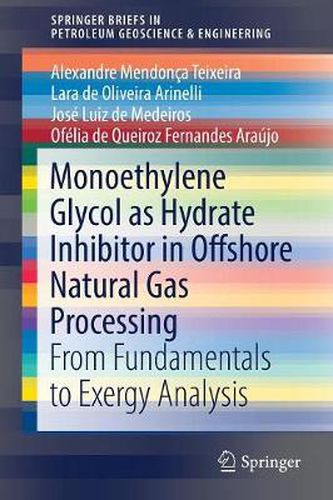Readings Newsletter
Become a Readings Member to make your shopping experience even easier.
Sign in or sign up for free!
You’re not far away from qualifying for FREE standard shipping within Australia
You’ve qualified for FREE standard shipping within Australia
The cart is loading…






This title is printed to order. This book may have been self-published. If so, we cannot guarantee the quality of the content. In the main most books will have gone through the editing process however some may not. We therefore suggest that you be aware of this before ordering this book. If in doubt check either the author or publisher’s details as we are unable to accept any returns unless they are faulty. Please contact us if you have any questions.
This book addresses several issues related to hydrate inhibition and monoethylene glycol (MEG) recovery units (MRUs) in offshore natural gas fields, from fundamentals to engineering aspects and from energy consumption assessment to advanced topics such as exergy analysis. The assessment of energy degradation in MRUs is critical in offshore rigs, and the topic of exergy theory has by no means been completely explored; it is still being developed. The book presents a comprehensive, yet concise, formulation for exergy flow and examines different approaches for the reference state of MEG and definition of the reference environment so as to obtain an effective exergy analysis with consistent results.
It also provides new and useful information that has a great potential in the field of exergy analysis application by assessing energy degradation for three well-known MRU technologies on offshore rigs: the Traditional Atmospheric Distillation Process; the Full-Stream Process; and the Slip-Stream Process. The book then elucidates how the main design parameters impact the efficiency of MEG recovery units and offers insights into thermodynamic efficiency based on case studies of general distillation-based processes with sharp or not too sharp cut, providing ranges for expected values of efficiencies and enhancing a global comprehension of this subject. Since MEG recovery is an energy consuming process that invariably has to be conducted in a limited space and with limited power supply, the book is a valuable resource for those involved in design, engineering, economic evaluation and environmental evaluation of topside processing on offshore platforms for natural gas production.
$9.00 standard shipping within Australia
FREE standard shipping within Australia for orders over $100.00
Express & International shipping calculated at checkout
This title is printed to order. This book may have been self-published. If so, we cannot guarantee the quality of the content. In the main most books will have gone through the editing process however some may not. We therefore suggest that you be aware of this before ordering this book. If in doubt check either the author or publisher’s details as we are unable to accept any returns unless they are faulty. Please contact us if you have any questions.
This book addresses several issues related to hydrate inhibition and monoethylene glycol (MEG) recovery units (MRUs) in offshore natural gas fields, from fundamentals to engineering aspects and from energy consumption assessment to advanced topics such as exergy analysis. The assessment of energy degradation in MRUs is critical in offshore rigs, and the topic of exergy theory has by no means been completely explored; it is still being developed. The book presents a comprehensive, yet concise, formulation for exergy flow and examines different approaches for the reference state of MEG and definition of the reference environment so as to obtain an effective exergy analysis with consistent results.
It also provides new and useful information that has a great potential in the field of exergy analysis application by assessing energy degradation for three well-known MRU technologies on offshore rigs: the Traditional Atmospheric Distillation Process; the Full-Stream Process; and the Slip-Stream Process. The book then elucidates how the main design parameters impact the efficiency of MEG recovery units and offers insights into thermodynamic efficiency based on case studies of general distillation-based processes with sharp or not too sharp cut, providing ranges for expected values of efficiencies and enhancing a global comprehension of this subject. Since MEG recovery is an energy consuming process that invariably has to be conducted in a limited space and with limited power supply, the book is a valuable resource for those involved in design, engineering, economic evaluation and environmental evaluation of topside processing on offshore platforms for natural gas production.